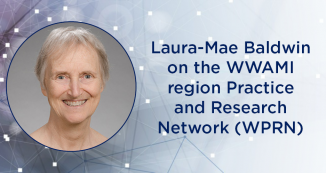
28 Jun Q&A: Extracting Electronic Health Record Data in a Practice-Based Research Network
Thanks to the widespread adoption of electronic health records (EHR), there are a growing number of opportunities to conduct research with clinical data from patients outside traditional academic research settings. However, researchers face challenges when working with this data that was created primarily for billing and clinical care purposes.
To help researchers overcome these, the Institute of Translational Health Sciences’ Data QUEST Coordinating Center, which oversees Data QUEST—a primary care EHR data-sharing infrastructure—created a process that guides EHR data extraction.
Dr. Allison Cole, the Associate Director of the ITHS WWAMI region Practice and Research Network (WPRN), and colleagues at ITHS recently described this process in the journal eGEMS.
We sat down with Cole to learn more.
The adoption of electronic health records offers significant opportunities to conduct research with clinical data. But, as you mention in the paper, there are also significant challenges associated with using EHR data for research. Can you talk about the challenges?
The most common challenges occur because using the data for research is different than the purpose that the data was originally collected for. EHR data is mostly collected for either billing purposes or clinical care, and not with research in mind. Anytime you try to use data in a secondary way or for some purpose it was not initially intended to, you can run into challenges.
The ITHS Data QUEST Coordinating Center—a team of researchers that offer consultation and support to those interested in working with Data QUEST—created a three-step process that helps overcome those challenges and support EHR data extractions. Can you walk us through these three steps?
The three steps are not exactly sequential, but they are three things that are important to think about.
The first is thinking about the context of EHR data. If you understand the clinical context that the data was collected in, you may realize it actually represents something different than you originally thought. That difference could be really important—either in planning your study or interpreting your outcome. The only way to know the context of the EHR data is to have a connection to the practice where the data is collected. That is one of the roles of the coordinating center—to support that relationship between researchers and the community-based practices.
The second piece is creating and maintaining a governance structure to support exchange of EHR data. If you are using it for research, managing the data and being good stewards of the data is important. Work with the practices to understand how the data will be used, how the results will be shared, and who will have access to the data.
The third is defining data parameters for creating EHR data extractions. During this process, it is critical that you understand the context of the EHR data and know what parameters you might use to create a data extraction. Also, be aware that creating those parameters will have downstream effects on your results and the interpretations of findings. You really need someone who is familiar with EHR data extraction to understand that. It is not always intuitive to researchers. There could be decisions you make just in creating the data extraction that could potentially bias your results.
Why did you create this process?
Data QUEST is striving to bring together data from community-based practices into a centralized resource that can be used for research and quality improvement. We had to be thoughtful about what the needs of the community-based practices and researchers were, and we created a process that could make it work. This was the first time that these unique practices were being brought together for this purpose.
In the paper, you discuss that collaboration between academic researchers, community-based practices, and a multidisciplinary coordinating center team is critical for efficiently leveraging EHR data. Why is this collaboration so important?
Each of those three groups brings something different to the table. Without any one of them, the picture would be incomplete. You need the community practices to help you understand the clinical context the data was collected in. That helps inform researchers about what questions are important to ask and what research is feasible to do in those settings. The coordinating center brings the expertise in working with this data and supports the relationships.
It seems like there was a lot of work that went into developing these processes and getting the ITHS Data QUEST Coordinating Center off the ground. Who did you collaborate with to pull off a project of this size?
Data QUEST is a longstanding collaboration between Biomedical Informatics and Community Engagement in the Institute of Translational Health Sciences. Kari Stephens, from Biomedical Informatics, and Laura-Mae Baldwin, director of the WWAMI region Practice and Research Network, are leaders in the Data QUEST Coordinating Center. Each were instrumental in developing Data QUEST and creating a governance and operational structure to support its ongoing work.
A critical component of your process is understanding and exploring how creation of patients groups could potentially bias findings. How can researchers avoid the risk of bias?
I think it is a question of whether you can avoid it or just acknowledge it and address it. The hope for this paper and this work is not to say that it could be totally avoided, but that it really needs to be acknowledged in your study design and the papers you write and report.
What steps should researchers take to ensure they are successfully and efficiently leveraging EHR data for research?
There is a huge opportunity for researchers to work with EHR data because it is so widely available. Our message is that this is a great opportunity. People should be thinking about this and trying to do it.
Also, unless you are experienced in working with EHR data and a coordinating center, then an experienced team is going to be instrumental to success. If you are working with Data QUEST data, then involving the Coordinating Center is critical. If you are working with EHR data from another source, then find the equivalent of a coordinating center or an institutional team member that has that expertise.
Who should researchers contact to learn more about Data QUEST and the Data QUEST Coordinating Center?
Researchers should use the contact form on the Data QUEST website.







